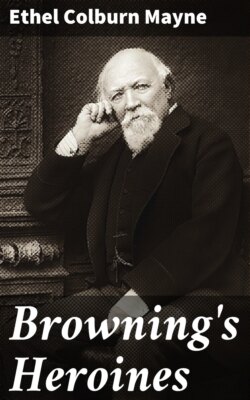Читать книгу Browning's Heroines - Ethel Colburn Mayne - Страница 16
На сайте Литреса книга снята с продажи.
IV. EVENING; NIGHT: THE ENDING OF THE DAY
ОглавлениеOur interest now centres again upon Pippa—partly because the Evening and Night episodes are little touched by other feminine influence, but also (and far more significantly) because the dramatic aspect of the work here loses nearly all of its peculiar beauty. The story, till now so slight yet so consummately sufficient, henceforth is involved with "plot"—that natural enemy of spontaneity and unity, and here most eminently successful in blighting both. Indeed, the lovely simplicity of the earlier plan seems actually to aid the foe in the work of destruction, by cutting, as it were, the poem into two or even three divisions: first, the purely lyric portions—those at the beginning and the end—where Pippa is alone in her room; second, the Morning and Noon episodes, where the dramas are absolutely unconnected with the passing girl; third, these Evening and Night scenes, where, on the contrary, all is forced into more or less direct relation with the little figure whose most exquisite magic has hitherto resided in the fusion of her complete personal loneliness with her potent influence upon the lives and characters of those who hear her sing.
Mr. Chesterton claims to have been the first to point out "this gross falsification of the whole beauty of Pippa Passes"—a glaring instance, as he says, of the definite literary blunders which Browning could make. But though that searching criticism were earliest in declaring this, I think that few of us can have read the poem without being vaguely and discomfortably aware of it. From the moment of the direct introduction of Bluphocks[68:1] (whose very name, with its dull and pointless punning, is an offence), that sense of over-ingenuity, of "tiresomeness," which is the prime stumbling-block to whole-hearted Browning worship, becomes perceptible, and acts increasingly upon our nerves until the Day is over, and Pippa re-enters her "large, mean, airy chamber."
On her return to Asolo from Orcana, she passes the ruined turret wherein Luigi and his mother—those Third Happiest Ones whom in her thoughts she had not been able to separate—are wont to talk at evening. Some of the Austrian police are loitering near, and with them is an Englishman, "lusty, blue-eyed, florid-complexioned"—one Bluphocks, who is on the watch in a double capacity. He is to point out Luigi to the police, in whose pay he is, and to make acquaintance with Pippa in return for money already given by a private employer—for Bluphocks is the creature of anyone's purse.
As Pippa reaches the turret, a thought of days long, long before it fell to ruin makes her choose from her store of songs that which tells how—
"A king lived long ago,
In the morning of the world
When earth was nigher heaven than now;"
and coming to be very old, was so serene in his sleepy mood, "so safe from all decrepitude," and so beloved of the gods—
"That, having lived thus long, there seemed
No need the king should ever die."
Her clear note penetrates to the spot where Luigi and his mother are talking, as so often before. He is bound this night for Vienna, there to kill the hated Emperor of Austria, who holds his Italy in thrall; for Luigi is a Carbonarist, and has been chosen for this "lesser task" by his leaders. His mother is urging him not to go. First she had tried the direct appeal, but this had failed; then argument, but this failed too; and as she stood at end of her own resources, the one hope that remained was her son's delight in living—that sense of the beauty and glory of the world which was so strong in him that he felt
"God must be glad one loves his world so much."
This joy breaks out at each turn of the mother's discourse. While Luigi is striving to make plain to her the "grounds for killing," he thinks to hear the cuckoo, and forgets all his array of facts; for April and June are coming! The mother seizes at once on this, and joins to it a still more powerful persuasion. In June, not only summer's loveliness, but Chiara, the girl he is to marry, is coming: she who gazes at the stars as he does—and how her blue eyes lift to them
